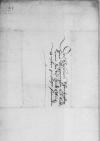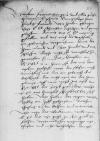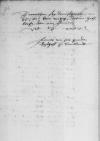Wir haben gestriges thags E(wer) E(rbarkei)t ⌊⌋ erhalthen und gerne gelessenn, / doraus uns E(wer) E(rbarkei)t meynung gefallen / und uns auch des vorschobs tzu gebrauchen vorgenohmen, / domit der ⌊hern landt und stet⌋ hendel und entschlossne rethe nicht sso vorachtlich hingeworffen etc.
Das schreyben an ⌊ko(niglich)e m(aieste)t⌋, u(nsern) a(llergnedigsten) hern, / sso das mit dem ersten geschehe, / were der sachen nicht unnutzlich, mit dar ein gebracht die botschaft, / der nicht eyne an die hern gelangt, / uff was weyse ins erst von ko(nigliche)r m(aieste)t die zceyse gefurdert, / welche E(wer) E(rbarkei)t ane tzweyfel schriftlich bey sych haben. / Wyr haben der wegen weytlofftig an hoff geschryben, / warthen theglich unsers bothen und antwurts. / Wye wir das uberkomen, / wolle wirs E(wer) E(rbarkei)t, die wyr Gothe in sein gnad befelhen, / vortrawlicher meynunge myttheylen und nicht vorhalthen, / doruff  APG, 300, 29, 452, p. 56 zu warthen / sey dem schreyben an ko(niglich)e m(aieste)t kein vortzog. /
APG, 300, 29, 452, p. 56 zu warthen / sey dem schreyben an ko(niglich)e m(aieste)t kein vortzog. /
 APG, 300, 29, 452, p. 56 zu warthen / sey dem schreyben an ko(niglich)e m(aieste)t kein vortzog. /
APG, 300, 29, 452, p. 56 zu warthen / sey dem schreyben an ko(niglich)e m(aieste)t kein vortzog. /


